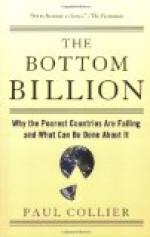If I were wind I’d turn my breath
upon
The calm-bound mariner until, anon,
The eager craft on which he sailed should
find
The harbor blest towards which it hath
inclined.
And in the city streets, when summer’s
days
Were withering the souls with scorching
rays,
I’d seek the fevered brow and aching
eyes
And take to them a touch of Paradise.
If I were water it would be my whim
To seek out all earth’s desert places
grim,
And turn each arid acre to a fair
Lush home of flowers and oasis rare.
Resolved in dew, I’d nestle in the
rose.
As summer rain I’d ease the harvest
woes,
And where a tear to pain would be relief,
A tear I’d be to kill the sting
of grief.
If I were gold, I’d seek the poor
man’s purse.
I’d try to win my way into the verse
Of some grand singer of Man’s Brotherhood,
And prove myself so pure, so fraught with
good.
That all the world would bless me for
the cup
Of happiness I’d brought for all
to sup.
And when at last my work of joy was o’er
I’d be content to die, and be no
more!
John Kendrick Bangs.
From “Songs of Cheer.”
THE GIFTS OF GOD
Why are we never entirely satisfied? Why are we never at absolute peace or rest? Many are the answers that have been made to this question. The answer here given by the poet is that so richly is man endowed with qualities and attributes that if contentment were added to them, he would be satisfied with what he has, and would not strive for that which is higher still—the fulfilment of his spiritual cravings.
When God at first made Man,
Having a glass of blessings standing by;
Let us (said He) pour on him all we can:
Let the world’s riches, which dispersed
lie,
Contract into a span.
So strength first made a way;
Then beauty flow’d, then wisdom,
honor, pleasure
When almost all was out, God made a stay,
Perceiving that alone, of all His treasure,
Rest in the bottom lay.
For if I should (said He)
Bestow this jewel also on My creature,
He would adore My gifts instead of Me,
And rest in Nature, not the God of Nature.
So both should losers be.
Yet let him keep the rest,
But keep them with repining restlessness:
Let him be rich and weary, that at least,
If goodness lead him not, yet weariness
May toss him to My breast.
George Herbert.
A PHILOSOPHER
“The web of our life is of mingled yarn, good and ill together,” says Shakespeare. It behooves us therefore to find the good and to make the best of the ill. Two men were falling from an aeroplane. “I’ll bet you five dollars,” said one, “that I hit the ground first.”




